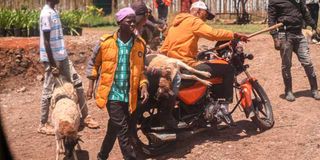Of myths, state and terrible mistakes

Part of the gang that invaded Kenyatta family-owned Northlands City make away with livestock stolen from the farm on March 27, 2023.
I went to meet a politician some time ago at his request. He didn’t show up, so I called him. He did not pick up my call. After an interval, I called again. He did not pick up.
Irritated and imagining that the fellow was probably feeling lazy about being driven across town and he was taking hot chocolate, talking to his mates, checking his phone ring, imagining my outrage and howling with laughter like a demented monkey, I was pissed off.
In revenge, I blocked him and forgot about it. After some time, I received a furious text message from a strange phone.
“Why are you behaving like a campus girl bwana!??” he screamed.
It was my turn to make him feel like a demented monkey. We were being childish and immature, but nothing of importance was at stake. Had it been serious business and he did not show up, I’d have driven to his office and tracked him down.
I was taken aback when I read in the press that Kikuyu MP and Majority Leader Kimani Ichung’wa blocked former President Uhuru Kenyatta in 2018 and they did not speak for three years when Mr Kenyatta was still in office.
I can imagine whatever the then President told Mr Ichung’wa must have been very wounding. Powerful politicians have two sides to them — they can turn on the charm when they want to win you over for some end, or they can be very cold when you threaten their interests.
There are many politicians, especially from Kikuyuland, who say they were mistreated by former President Kenyatta. Deputy President Rigathi Gachagua, it is said, had his business — to do with government tenders, I think — damaged, he was humiliated, arrested and prosecuted and his bank accounts frozen.
President Ruto went through his own tribulations, as did Mwai Kibaki and Daniel arap Moi. It goes to show that Kenyan politics at that level tend to be rough, and very hard on emotions.
Boniface Mwangi, the activist, has a couple of times tweeted the wisdom of Dr Willy Mutunga, former Chief Justice, on why he forgives and does not seek to hurt the tyrants who hurt him.
“Your oppressor is not your teacher,” he says. You have to be the better being.
Matters of business, policy and government are rational, feelings are irrational. Again, emotions are handled. They hand over control of your mind to adversaries.
Intimidate adversaries
I don’t know whether leaders can indulge in emotion and wallow in their own hurt. They are human, yes, but they are more than just human. They are leaders. I suppose it is utilitarian to show pain and grief to empathise with the afflicted and a leader can project anger to intimidate adversaries and rally the public.
But their own pain? On their sleeve? I was told a story by someone who interacted with President Kibaki and his reaction to people feeling sorry for him when he was under tremendous pressure.
If people expect to have a cup of tea, they shouldn’t feel sorry for the kettle, they should let it do its job, was his attitude.
The invasion of Northlands, the seat of the Kenyatta empire, was the worst mistake of the Ruto administration so far. I’m making the reasonable assumption that, as reported by the Daily Nation, 3,000 suspected Mungiki did not mobilise, transport and pay themselves Sh3,000 each without anyone in the security system, least of all the police who, according to their boss, were allegedly busy with the Azimio demos, catching a whiff of it.
Nations are myths, they don’t exist in objective reality. Their pillars are other stories we tell ourselves about heroes and champions who achieve great feats for us; this adds value to the nation as a priceless gift that was forged in great adversity and also gives us examples to emulate and behaviours to model, which in turn sustains the nation-myth.
Jomo Kenyatta, like George Washington, is not a man; so his land grabbing, or in the case of Washington, slave loving, is immaterial.
During a time of great suffering and peril, he was our north star and he suffered for it. He inspired us with his sacrifice, courage and strength and, at independence, wisdom.
You cannot equate him, his memory and his value to the nation-myth to me, for instance. Sending 3,000 suspected Mungiki to invade his widow’s property is like desecrating a temple, monument or other pillars of that priceless myth.
Worst of all, those shenanigans put President William Ruto in an impossible position. The land invasion is the kind of thing that would require the express authority of the chief himself.
To say that all these folks were mobilised, briefed and paid, as reported by the Daily Nation, and the President was kept in the dark, or that it was done without his authority, is to cast the Head of State in the worst of light: a state of cluelessness and impotence on a scale worse than the mnataka nifanye nini event.
And if this was done in the campus girl spirit — and I’m not saying it was — I should feel sorry for that kettle.





